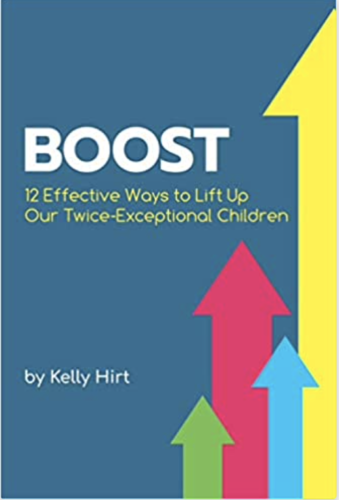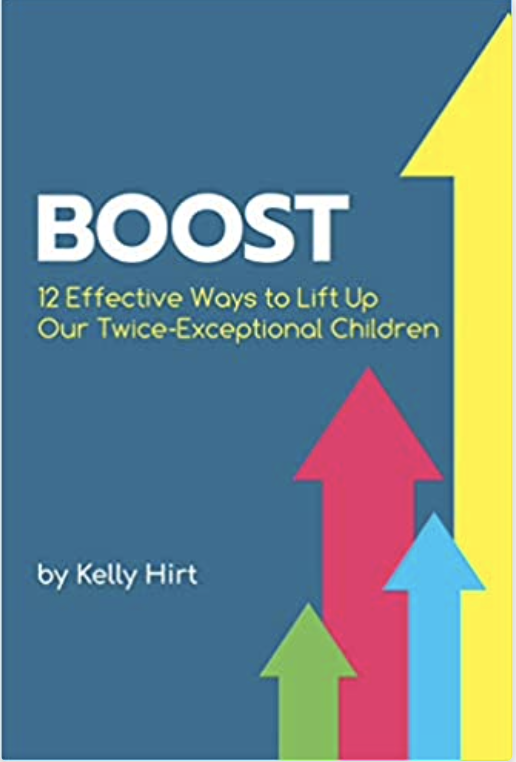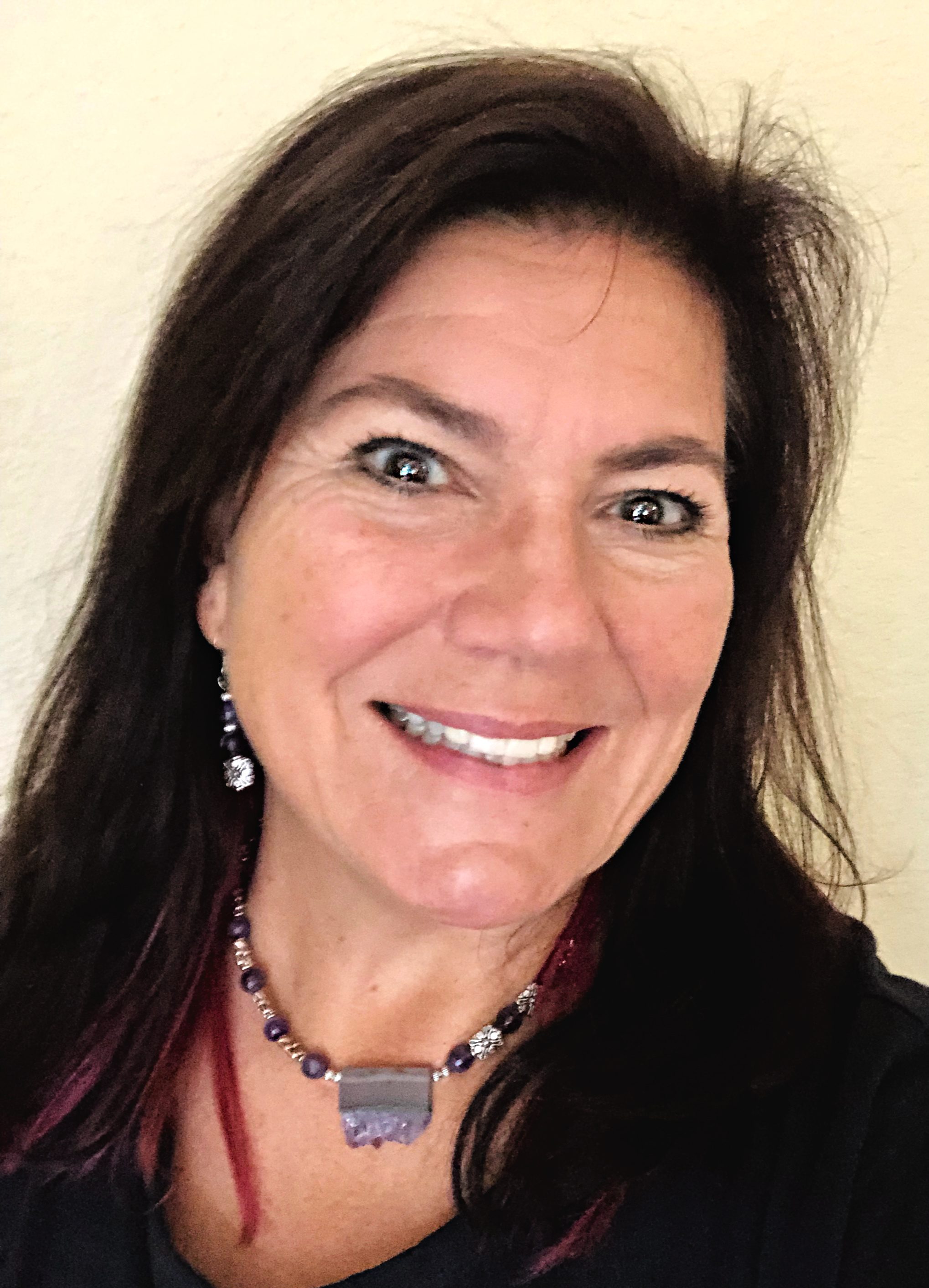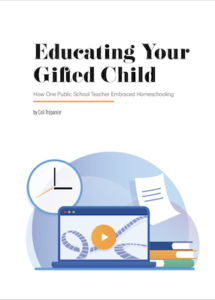{Book Review} Boost: 12 Effective Ways to Lift Up Our Twice-Exceptional Children

Are you teaching or parenting a 2e child? Are you looking for tried-and-true strategies which can work in the classroom, at home or with homeschooling your 2e child? Do you ever wish you could have a straight-forward, reliable, step-by-step blueprint to help you navigate effectively and successfully your journey through educating and raising your 2e child? I admit that I have always wanted the same holy grail or magic bullet to definitively guide me, step by step, during the inevitable struggles of educating and raising my own 2e children.
Well, here’s the magic bullet, the holy grail—the book you’ve been waiting for—Boost: 12 Effective Ways to Lift Up Our Twice-Exceptional Children by Kelly Hirt and published through GHF Press.
The author, Kelly Hirt, a 25-year veteran teacher, is also the mother of a 2e child, and at one time, left the classroom to homeschool her child who was not receiving the needed educational accommodations and understanding which nearly all 2e gifted learners are denied in traditional school settings. Her experiences as a teacher, a mother, and a homeschooler have given her the unique insight into what methods and strategies work best to give our twice-exceptional children the educational, social and emotional interactions which best feeds their minds and fulfills their potential.
Kelly devised her own 12 detailed strategies—educate, communicate, investigate, separate, anticipate, accommodate, accelerate, fascinate, participate, evaluate, negotiate, and appreciate—to help both teachers and parents successfully navigate the murky, turbulent waters of making sure our 2e children are nurtured and getting their unique emotional, social and educational needs met. With each of the twelve strategies, Kelly devotes an entire chapter to explaining in detail, with a multitude of relevant examples, how to implement each procedure, and why each strategy is necessary. Also provided are suggestions on how to modify the method to meet the needs of any particular 2e child best, because as Kelly so poignantly quoted in her book, “As the saying in 2e circles goes, ‘If you’ve met one 2e child, you’ve met one 2e child.’”
This book is a treasure-trove of suggestions, advice, information, knowledge, help, and support that you will return to time and again—for both teachers and parents.
Is your 2e child frustrated, disengaged and possibly underachieving in his traditional school setting and so far, conferences with his teachers and the school’s administrators are not leading to productive solutions? I’ve been in that very situation, more than once, and I would have bought several copies of Boost: 12 Effective Ways to Lift Up Our Twice-Exceptional Children. Respectfully asked my child’s teacher/s and administrators to read this book to understand better the unique needs and traits of our 2e children and learn the best strategies to improve the educational, emotional and social lives of the 2e children in their classrooms.
As a parent, Kelly Hirt’s 12 Boost Strategies will give you new and better insights and understandings of your 2e child. And you will find optimal solutions and the most effective ways to implement these solutions at home, in your homeschool, or as gentle suggestions to your child’s teacher.
Aside from educators and parents, Boost: 12 Effective Ways to Lift Up Our Twice-Exceptional Children is a book which would be invaluable for use in the education of pre-service teachers, as well as for psychological and medical professionals who deal with gifted and 2e children in their practices. The grave and huge misunderstanding of our 2e children is a hindrance to their education, their social lives, and their ability to reach their full potential—why shouldn’t any influential adult in the life of a 2e child not need to understand our 2e children better?
Our children are our greatest natural resource, and we should all work to better their lives to ensure they fulfill their potential and become happy, well-adjusted adults. Our 2e children, who have been consistently misunderstood, deserve the same. Boost: 12 Effective Ways to Lift Up Our Twice-Exceptional Children can unravel the misunderstandings while offering definitive, effective and invaluable solutions which provide our 2e children with the support and nurturing they need to live better lives, fulfill their potential and become happy, well-adjusted adults.
Let me introduce you to the author of Boost: 12 Effective Ways to Lift Up Our Twice-Exceptional Children, Kelly Hirt. I had a wonderful interview with Kelly and had a few questions for her about her book.

Q1) Can you share a little about who you are and what your experiences have been?
A1) I had been an elementary school teacher for about 14 years when I became a parent. I was excited when I learned my son was gifted and I fully expected him to love school. That did not happen. He was misunderstood by his teachers and his struggles were highlighted daily. He was bullied, and his giftedness was doubted. We tried two public schools and a private school before we fell into homeschooling. After the dust settled, I realized that his teachers didn’t understand giftedness, let alone twice-exceptionality, and many of my colleagues didn’t know either. That is what caused me to write my book entitled Boost: 12 Effective Ways to Lift Up Our Twice-exceptional Children.
Q2) Can you explain to everyone what the difference is between gifted and 2e learners?
A2) While both groups have high IQs, 2e learners possess unevenly dispersed strengths. Their giftedness often masks their disabilities or the opposite when their disabilities prevent them from reaching their potential. There is a lot of confusion about 2e learners and that often leaves to underserved, struggling students.
Q3) Why do you think there are so many confusions about twice-exceptional learners?
A3) 2e children are complex and many educators still do not understand these learners. When 2e learners are unseen and underserved, behaviors, frustration, and self-esteem issues can often follow. Twice-exceptional learners are often misrepresented as lazy, unmotivated, disruptive, and argumentative. Their giftedness is doubted due to antiquated ideas about what giftedness is and isn’t.
Q4) What do you think the biggest misconceptions are about giftedness and twice-exceptional learners?
A4) I think many people think that efforts and support should go to the academically struggling students. Many educators think that gifted students will be okay no matter what. Many teachers still do not understand what giftedness really is and what it is not. They think that gifted students must be producing beautiful work in all subject areas, work well cooperatively, and should be able to stretch themselves with little or no support. That is just the confusion about gifted learners and there is even more misunderstanding around the 2e learners.
Q5) What can parents do to help their twice-exceptional child?
A5) Education is the key. Parents must educate themselves about the unique needs of the 2e child. They must educate family and their children’s teachers. They must become an advocate and find a tribe which can support them. Gifted Homeschool Forum was that place for me. Parents must also practice self-care as it can be exhausting to be the parent of a twice-exceptional child.
Q6) So tell us about your book. Why did you write it and how is it different from other books?
A6) I wrote Boost: 12 Effective Ways to Lift Up Our Twice-exceptional Children for parents and educators. After spending over 25 years in the classroom and embarking on my own journey with my 2e son, I discovered 12 themes or strategies that made a significant difference. These strategies are active and easy to implement. I wanted a book that was easy to read, that was not bogged down with technical terms and theory. I know that being a teacher is a demanding job and I wanted a book that would not be daunting. I also know that parenting a 2e child is exhausting, so my book needed to be a quick read for parents and something they could use right away.
Q7) As a teacher yourself, what advice do you have for other educators?
A7) In addition to implementing Boost, educators must receive training about engaging their 2e students. They must understand the difference between their gifted students and their 2e kids. They must consider previous curriculum, thinking and strategies to better fit these learners. If they are not offered training by their administration, they must seek the answers to their questions on behalf of the students that teacher. Teach ALL students. In addition, they must insist that their administrators and support staff are also educated as their ignorance can damage classroom progress.
Thank you, Kelly. We all appreciate your time and work with twice-exceptional learners.
 Crushing Tall Poppies
Crushing Tall Poppies




I’ve found some interesting bits of education history from the 1970s I was only vaguely aware of before:
https://www.bbc.co.uk/news/magazine-29518319
https://jacobinmag.com/2017/10/scotland-corporal-punishment-britain-schools-action-union
http://www.tatehausman.com/wp-content/uploads/2007/05/freeschools-hausmanthesis.pdf
Thank you for these great links! Our modern-day education systems have some interesting histories, for sure!
Is there agreement in the gifted community about how the education system should ideally screen for giftedness and 2E? For example should all children be IQ tested or only those who show certain behaviours? I’d never thought about this before as I was tested when I was six, but then I remembered I was only tested because my sensory OE made the textures of most foods repulsive to me. So it looked like I had an eating disorder and being tested was part of the treatment for that. How many routes are there, or should there be, that steer children towards being tested?
Sadly, testing for giftedness has historically been left up to schools, and each school and school system has different policies on who is recommended for testing, and if or when the testing would take place.
The gifted community is divided between two trains of thought about giftedness: 1. that giftedness is an inherent trait and therefore cannot be developed or “created”, and 2. that giftedness can either be inherited or developed with nurturing (this is the talent development community within the gifted community). This is likely the reason why there is no consensus on how, when or if screening for giftedness should take place.
If the gifted community were united on “where” giftedness comes from or what exactly constitutes giftedness, then maybe we could come to an agreement on screening, but personally, I’d prefer it not rest on the shoulders of schools and teachers who routinely misunderstand giftedness, especially 2E kids. Screening and testing for giftedness has been a hit or miss event, at least here in the U.S.
I suspected it would be something like this. We say schools should do right by the gifted but how many of us would really trust them to do it right? Especially as bureaucracy seems to be anathama to the majority of the gifted. Maybe it is best to stay as a rebellious and at separate thing. This happens in other fields as well. Harm reduction started among drug users and radical front-line drug support workers. Then it became fashionable and became official policy and some people think official support messed up what it was supposed to be about.
I can also attest to the sense of liberation that comes from going to a different place with people who get it. It’s the start of the ‘rescue’ or ‘Hogwarts’ fantasy. Even though it wasn’t a magnificent gothic building with stained glass and green sward, but a community health centre in an ugly brutalist building. If there had been place I could have gone to long-term I wouldn’t have cared if it looked like it was built in Bulgaria in the 70s, or if it was a prefab on some waste ground. As long as I didn’t have to go back to the salt mines. I actually think that could be quite a good look for us – the defiant group in the ratty unwanted building. It would also help control the envy and resentment gifted children seem to inspire.
Although the words gifted and talented are often joined together I think of them as very different things. Talented is being exceptionally good at one to maybe three things, and being basically normal in other ways. If you provide the resources to develop those talents it’s all good. But giftedness is pervasive. It is global. There is no escape. 🙂 There’s a lot of politics behind the different definitions of gifted, some of it admirable. The idea that it can be nurtured includes the idea behind Educating Rita – that a lot of working class people have had their confidence in their own intelligence destroyed and they can be helped to see their own abilities again. But as noble as that is it doesn’t disprove that some people are born gifted.
The more extreme push against the concept of giftedness and gifted programmes reminds me of Booker T Washington suggesting industrial education only for black Americans. It’s about not rocking the boat. (Although reading about the many benefits of manual training does make me wonder if he was up to something more sophisticated than just going along with white supremacy, and if he may have been unfairly maligned.) Regardless of his motivations, both what he did and what the anti-giftedness crowd are doing are attempts to deny a specific group of people a specific kind of education. The question is why, and who would benefit from that state of affairs?
You hit a lot of nails on the head, there, at least for me.
Speaking about a place to escape for gifted people and the liberation it brings, I once had a lengthy conversation, not completely serious, with several gifted adults and we all spoke about starting a residential development for gifted families so that we all could live among a homogenous group of people who get it.
I also agree with you about the talent part. Someone can certainly be a talented athlete or talented musician and not have any traits of giftedness such as a higher IQ. I suspect the talented designation was added by the talent development community to be able to increase the number of children who may be enrolled in gifted education programs. The more children, the better for funding, support and maintaining the program. This does a grave disservice to intellectually gifted children who are often in gifted services with non-gifted students.
And any and all attempt to deny gifted children the appropriate and accelerated education they need is discrimination, but try to convince anti-gifted people that this is discriminatory when they believe gifted education is a desire, a reward, not a true educational need.
I always love reading your insights–so on point and thought-provoking! Thank you for all of your comments on my site!
Let me know when lots are being sold in that community. What should be set as criteria for membership, Mensa-level or triple-nine?
I keep checking to see if you’re going to write another post. It seems like maybe you’re all done, chicks fledged. It’s a pity.
Another of the problems of “gifted” education is that when it’s set up by the state, or by most schools, it’s usually gated by past grade-level performance. If kids fit in to grade-level work well enough to get straight As, wouldn’t that tend to demonstrate that those kids don’t need gifted education very much?
Once a “gifted” school becomes prestigious, then it will be flooded with ambitious kids of tiger parents who had them tutored to within an inch of their potential. There will be no room left for actual gifted kids.
I think gifted kids might be best off in a school that’s modest enough to understand it doesn’t have all the answers and can’t supply all the needs of a gifted kid, but will still try to help the kid meet his needs with a mixture of their resources and external resources.
“Once a “gifted” school becomes prestigious, then it will be flooded with ambitious kids of tiger parents who had them tutored to within an inch of their potential. There will be no room left for actual gifted kids.” <---This is so true and it does happen, too often. Yes, you are right--I don't have much to write about since my youngest is in college. I lost my muses, however, I am working on my second book! It will be true stories (anonymous) of the daily lives of gifted people and families--their ups, downs, the good and the bad. A book that I hope will give readers a serious glimpse into the actual lives of gifted people in order to help them understand it is not always a cakewalk being gifted. If every school attended to EVERY child's needs and taught them at their level and in the way they learn best, then we wouldn't need so many special ed. programs. But, schools have become so standardized that too many kids don't fall into the "normal" or "standard" category anymore. It is now all about money and grades. And if a kid gets straight A's all the time, it means school is too easy for him. There needs to be a challenge for all kids. Thanks for all your insights--I love seeing everyone's differing views!
I bet the gifted housing development has happened a few times by accident because of the kind of people who are attracted to intentional communities. Consider what kind of minds must have created the Damanhur Temple. There’s a Swiss commune that supposedly knows how to create perpetual motion machines. Those kind of places have an interesting reputation as it is, can you imagine how much weirder it would get if you selected only gifted families? At a more basic level it would have been nice to have had children on the same street I could have played with growing up. I did have quite a few friends, especially between the ages of 10-13, but I had to cast a wider net to find them and few of them were really like me. If anybody wants to give it a go, the classic books on how to do it are Creating a Life Together and Finding Community by Diana Leafe Christian. There are also British and American organisations that promote community living –
https://www.diggersanddreamers.org.uk/
https://www.ic.org/
The real tragedy of those expanding the definition of giftedness to get more money is governents are going to be even less willing to provide it the more they think it’s going to cost. There is one good economic argument for gifted education – if it’s accelerated so they go to university younger they’ll be in education for fewer years overall. So it even if it costs more per year, it may end up being cheaper overall.
If there’s going to be a gifted programme there should probably also be another programme for high achievers to act as bait and lure the ambitious parents away from the gifted one. 🙂 It would need to carry a bunch of status markers to attract them and the gifted programme have a load of flashing warning lights all over it to make them think twice. So the high achievers get smart uniforms, grand buildings and prestigious exams, the gifted school has a democratic structure and a reputation for left-wing teachers. That should do nicely. 🙂
On the left the comprehensive school with all abilites learning together is held up as the ideal. But I have serious doubts about whether, even done the best way it possibly could be, it could handle the almost reality-warping quality of the more extreme end of giftedness.
You are right, acceleration means a child will be in public school fewer years and costing less money. Also, I love your idea of having a program for high-achievers to satisfy ambitious parents, and your idea to make the high-achieving program more attractive and the gifted program less attractive is pure brilliance!
And thanks for those links!
So much appreciation for your insights and ideas! <3
Thank you for this information. Perhaps put a purchase link in the post?
Great idea! Thanks!